Dr Carolyn Lam
Co-founder
Us2.AI
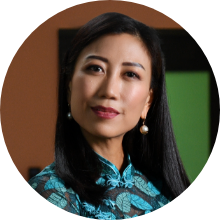
Dr Carolyn Lam
Co-founder
Us2.AI
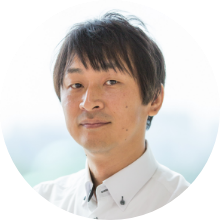
Dr Hideaki Shimada
CEO and Head of Research
Chugai Pharmabody Research
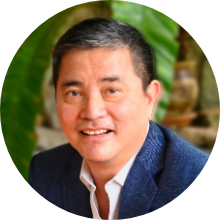
Lai Teik Kin
CEO
EyRIS
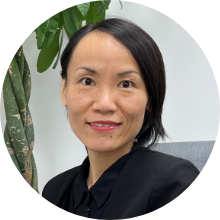
Li Yanfeng
Head of Singapore Production Operation
GenScript
Businesses in Singapore’s healthcare sector across biomedical, medtech, digital health and consumer health are taking on challenges that have long plagued the world. Through disease research, new technologies and innovative practices, they are transforming medical solutions for heart conditions, viruses, blindness — even lesser-known autoimmune diseases.
Us2.AI, for one, uses AI algorithms to read heart images as a cardiologist would. Chugai Pharmabody Research employs its proprietary antibody technology to create drugs for inflammatory diseases including less-common autoimmune diseases, cancer, and metabolic diseases. EyRIS harnesses deep-learning tech to prevent diabetic blindness. Meanwhile, GenScript Biotech Corporation’s leading gene synthesis technology delivers DNA constructs in just days, speeding up the development of new vaccines.
Changemakers at these successful Singapore-based businesses share their dreams of betterment for the world: Dr Carolyn Lam, co-founder of Us2.AI; Dr Hideaki Shimada, CEO and head of research at Chugai Pharmabody Research; Lai Teik Kin, CEO of EyRIS; and Li Yanfeng, GenScript’s Head of Singapore Production Operation.
Carolyn: AI in healthcare can increase access to, and the quality of, healthcare in underprivileged populations. We want to use our solution to increase access to heart health for all, and address existing inequities in our fight against cardiovascular diseases.
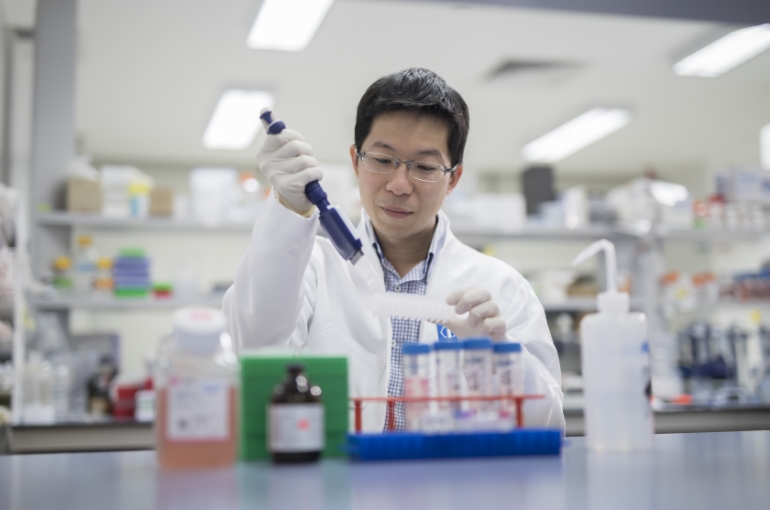
Photo credit: Chugai
Hideaki: We have big dreams to reframe healthcare by creating innovative drugs for unmet medical needs, and giving patients better access to life-saving drugs.
Teik Kin: We aspire to prevent vision loss and impairment globally, from Singapore. With the global diabetic population projected to rise to 700 million by 2045, and trained ophthalmologists typically concentrated in developed countries, our goal is to provide screening to more patients in low- and middle-income countries.
Yanfeng: Disease X is not undefeatable. Genes and proteins are the building blocks for vaccine, drug discovery, therapeutic and diagnostic tools. With technology and research, we can create new innovations and speed development of prototype vaccines to protect the world from new threats that do not exist yet.
Carolyn: I would call myself an accidental entrepreneur – I spent years studying to become a professor in cardiology and running a technology startup was never part of the plan! But it is this background that made me aware of a historically male-first approach to research and development. That is why at Us2.ai, we safeguard our product by including information not just from men, but from women too. Technology and innovation can make healthcare more open, inclusive and patient-centred.
Hideaki: Globally, many diseases such as cancer, inflammatory diseases, and metabolic diseases still lack drug treatments. Novel antibody technologies enable us to expand druggable targets and invent unique therapeutic actions to address these unmet clinical needs. At Chugai, one of the drugs in our pipeline is the crovalimab (SKY59), a monoclonal antibody drug in the final stage of clinical trials to treat certain autoimmune diseases – it is expected to become the first globally-approved drug of its kind in Singapore.
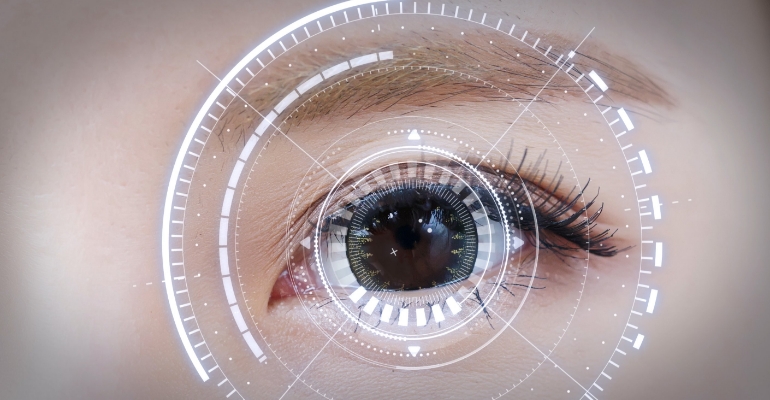
Teik Kin: Diabetic retinopathy, a major consequence of diabetes, is the leading cause of vision loss in working adults worldwide, and can lead to blindness. Although early screening reduces vision loss and impairment in diabetics by 47 per cent, procedures are tedious and time-consuming. That’s why we’ve partnered Singapore National Eye Centre and National University of Singapore School of Computing to develop, enhance and commercialise SELENA+ (Singapore Eye Lesion Analyzer Plus), a software medical device that uses deep-learning technology to detect eye diseases such as glaucoma suspect, age-related macular degeneration, and diabetic retinopathy, and deliver a diagnosis within 8.5 minutes.
Yanfeng: COVID-19 showed us the importance of disease research in effectively preventing and responding to epidemics. In early 2020, GenScript’s researchers, Duke-NUS Medical School and A*STAR played a key role in the SARS-CoV-2 vaccine discovery with the invention of cPass™, the world’s first “rapid smart test kit”, which can measure neutralising antibodies in an hour. This has equipped many vaccine developers around the world to combat the pandemic.
Hideaki: As a scientist, I personally believe that our profession should make the most of our capabilities for the betterment of society – this firm sense of mission has driven me to dedicate my career to the field of drug discovery research.
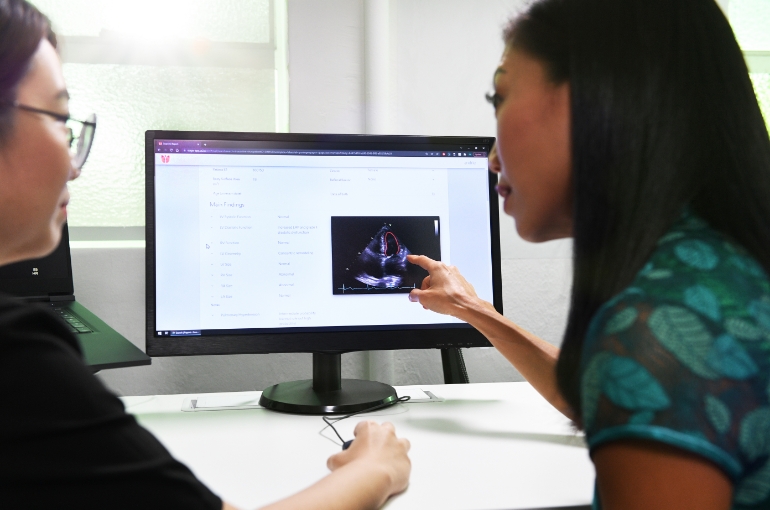
Photo credit: Us2.AI
Carolyn: I am personally passionate about supporting and cheerleading other women. Women who are looking to become doctors, professors and trialists; women considering setting up a business to become a founder; and women who just need help with their health but are being dismissed because their voices are not heard.
Teik Kin: For me and my team, we want to be part of a positive change, guided by our ambition to revolutionise healthcare delivery through deep technology – healthcare can, and should be, efficient, affordable and inclusive.
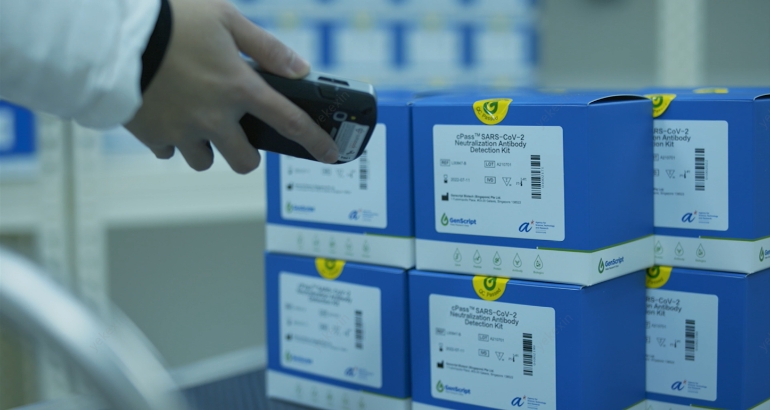
Photo credit: GenScript
Yanfeng: Singapore’s vibrant and thriving biotech ecosystem has helped GenScript to grow and expand to deliver innovative, efficient and effective healthcare solutions for the world – the global success of cPass is testimony to the city-state’s attractive talent pool of researchers and partners as well as its robust manufacturing capabilities.
Carolyn: Singapore is great for businesses. The government has an added focus on startups in deep technology, and with its ongoing support, we have been able to grow more quickly. Being based here has also enabled our ambition to build a future where everyone — from the most advanced to resource-constrained communities — has equal access to high quality, consistent and inexpensive heart scans (echocardiography).
Hideaki: Drawing on Singapore’s strong infrastructure and highly trained pool of multinational scientists has been pivotal in helping us establish and strengthen our presence in the region. The strong support of government agencies such as EDB and A*STAR has also been instrumental in helping us to develop innovative medicine that can make a difference in the lives of patients around the world.
Teik Kin: Despite our size, Singapore is an acknowledged leader in technological adoption and innovation. I think we are very fortunate to be in an environment where experimentation and learning is encouraged and supported, which has created multiple opportunities seen by few around the world.
Yanfeng: Singapore’s ability to keep punching above its weight in healthcare and tackling global issues, such as the pandemic and climate change, as a result of being open, collaborative and innovative is inspiring.